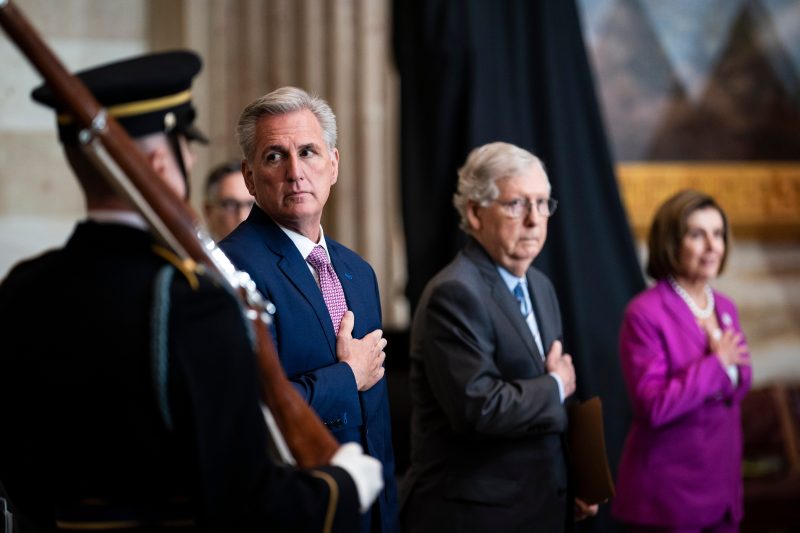A noisy minority can be powerful in politics. And rarely has that been the case as much as with the GOP, post-tea party. But Senate Minority Leader Mitch McConnell (R-Ky.) had a message during a visit to Munich last week: A noisy GOP minority is still a minority.
“I think there’s been way too much attention given to a very few people who seem not to be invested in Ukraine’s success,” he said. McConnell added that he would step up in making a case that he has long made: that the war is the most important worldwide priority.
He added in a Fox News interview: “Don’t look at Twitter. Look at people in power.” (He struck a similar tone in a statement Friday, saying that “my fellow leading Republicans and I” consider helping Ukraine’s defense “a direct investment in our own core national interests.”)
McConnell has a point. But his argument misses a key fact: It’s not just that his party’s critics of funding Ukraine have been noisy; it’s that unlike McConnell, Republican supporters have been quiet, largely allowing critics to dominate the public debate.
But on the first anniversary of the invasion, that appears to have begun to change.
This month, and especially in recent days, since lawmakers traveled to Munich and President Biden visited Kyiv, supporters of Ukraine funding have begun to assert themselves. A look back at lawmaker tweets and news releases from recent months via Legistorm reveals that while critics such as Reps. Matt Gaetz (R-Fla.) and Marjorie Taylor Greene (R-Ga.) and other House Freedom Caucus members were much more likely to talk about Ukraine, supporters are no longer ceding the debate stage.
Sen. Lindsey O. Graham (R-S.C.) partnered with former British prime minister Boris Johnson in a Wall Street Journal op-ed calling for getting Russia out of Ukraine altogether, and in the same pages New York Republican Party Chairman Ed Cox argued for a more Nixon-esque commitment to Ukraine.
New GOP presidential candidate Nikki Haley has given the more hawkish wing a champion in the presidential race — in contrast to Trump and a potential candidate, Florida Gov. Ron DeSantis (R) — arguing in no uncertain terms that success in the war is vital to preventing America’s adversaries, including China and Iran, from being emboldened.
Sen. Roger Wicker (R-Miss.) and Rep. Rob Wittman (R-Va.) wrote their own op-eds, and Republicans on the House Foreign Affairs Committee have joined in.
One Republican, moderate Rep. Brian Fitzpatrick (R-Pa.), even saw fit to praise Vice President Harris’s speech in Munich.
.@VP delivered an outstanding speech in support of Ukraine at @MunSecConf. I thank her for standing by Ukraine “for as long as it takes” and for making the case exposing Vladimir Putin’s crimes against humanity.
— Rep. Brian Fitzpatrick (@RepBrianFitz) February 18, 2023
Some Republicans have taken to criticizing Biden as doing too little rather than too much. Those include Cox and Rep. Darrel Issa (Calif.) who, during an appearance on Fox Business, pushed for F-16s, long-range rockets and even missiles to be supplied to Ukraine.
House Speaker Kevin McCarthy (R-Calif.) offered a similar view — after previously speaking more dispassionately and in more practical terms, and casting doubt on whether a GOP-led House would continue funding Ukraine.
“No, I support Ukraine,” McCarthy said when CNN asked him about a measure from Gaetz to halt further aid. “I don’t support a blank check, though. We spent $100 billion here; we want to win. I think the actions that President Biden has taken are a bit too late.”
Indeed, while their argument is often layered with objections to “blank checks” and the like, several have made the case that funding Ukraine’s defense is a relatively inexpensive way to fend off Russia.
“Congress is funding Ukraine’s defense because $115 billion in aid is cheaper, both in blood and treasure, than a ground war in Europe that will come if Putin attacks a NATO ally,” Rep. Richard McCormick (R-Ga.) said, echoing something McConnell has said.
Sen. John Cornyn (R-Tex.) on Wednesday shared a story from May 2022 in which his Texas colleague Sen. Ted Cruz (R-Tex.) made a similar case, arguing that the costs of a successful Russian invasion could be far steeper than the current bill. Cruz has sounded a more skeptical tone of late, particularly when it comes to economic assistance, and this week he joined some on the right in ridiculing Ukrainian President Volodymyr for his attire and suggesting that the air raid sirens that sounded during Biden’s visit were staged. Cornyn shared Cruz’s May 2022 take and said, “Bravo.”
Bravo: Ted Cruz Answers the Ukraine-Aid Bill’s Conservative Critics https://t.co/Jj67Ml83j7
— Senator John Cornyn (@JohnCornyn) February 22, 2023
Back then, Congress rather easily approved sending funds to Ukraine, with 57 GOP “no” votes.” But the $45 billion added in December was wrapped into a larger spending bill. And not only has opposition in the GOP base steadily grown to include around half of the party, but even just a vocal minority of the House GOP could try to prevent another vote when the time comes. That’s because the GOP controls the House, and the House Freedom Caucus has significant leverage over McCarthy.
As the GOP base has shifted on Ukraine, we’ve noted the lack of pushback from the party’s more hawkish wing and those who view the conflict as involving vital U.S. foreign policy issues. That relatively muted response is undoubtedly due, at least in part, to fear of alienating the likes of Fox News’s Tucker Carlson (as Boris Johnson recently ventured) and the more Ukraine-skeptical GOP voters.
But failing to make that case has real consequences. And now — however belatedly — it seems that Ukraine-supporting Republicans have decided it’s time to try to do something about it.

